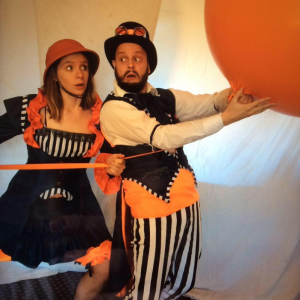This week is Cystic Fibrosis (CF) Awareness Week in the UK. To mark this important week, we have chosen to interview an inspiring local patient – James Alexander Hall, 27-year-old professional actor from Lincolnshire.
Our textbooks tell us CF is an autosomal recessive genetic condition that primarily affects the lungs and digestive system. To patients, it is a painful, life-limiting condition for which there is no cure. However, with improvements in medical treatments, more than half of CF patients in the UK will live past 41 years of age, with a better outlook for babies born today. I caught up with James to tell us why we should be CF aware all year round.
Hi James, you are now a successful professional actor. How does CF affect you on a daily basis?

The old cliché a lot of CF patients like throw around is that, “Cystic Fibrosis is not who you are, it’s just something you’ve got.” Well for me it’s totally different. It gives me the drive every day to push myself harder, because I believe our experiences make us who we are. Without CF I would be a different person. When I first started acting it was therapeutic to be non-CF when in character, but I use my experiences drawn from CF to reach different levels of emotional empathy. A career in acting and contemporary movement is exhausting, but acts as the cardiovascular part of my physiotherapy, which adds to the CF physiotherapy (usually autogenic drainage) I do every day. On days I’m not working, I take resting as seriously as performing, so my body can feel ready for the next show or rehearsal.
It’s much harder for a CF patient to gain weight due to poor fat absorption in the digestive system, so another thing that CF affects in my daily life is the need to hit as many calories as possible, which isn’t as fun as it sounds. Taking 20g of fat (i.e. a Snickers bar) for a certain tablet each time isn’t a great experience, especially on days when you don’t have much of an appetite. Some patients depend on supplements for this, but unfortunately I’m too much of a picky eater to stomach them, so I rely on all of the foods “normal” people view as “naughty”. It’s not a cheap way to live, especially paying for prescriptions and receiving next to nothing from disability allowances.
Chest infections – and trying to stay away from them – also affect me physically. I need to be careful to steer clear of people with coughs and potential pseudomonas breeding areas. They say it’s important to not live in a bubble and to live a normal life, but this method has worked for me so far!
How did CF affect you growing up?
I’ve always known I had CF as I was diagnosed at six weeks old. I had my first health scare at around six years old, when I suffered an anaphylactic shock due to IV antibiotics, which my old hospital wanted to give me annually as a precaution. My lips were blue, my oxygen sats down to 70% and I fell into unconsciousness, only to remember waking up with an oxygen mask on me and a crying doctor in the room who initially thought my shock was scarlet fever.
Growing up for me was, on the whole, not the hardest thing in the world until around the age of 13. No longer tied to the apron strings, I began playing football more than ever, which was great for exercise but not so good when playing in drenched clothes from carrying on through bad weather. Anything to be as normal as possible! My mum became Branch Secretary for our region for the CF Trust and she used to use me as an example to parents of newly diagnosed babies to put their minds at rest. I was always kept away from children with symptoms of a chest infection, but it was amazing to always be so actively involved in fundraising.
I had no knowledge about life expectancy until my mid teens when an internet troll said he would beat me up but didn’t have to as I would die by the time I was 40 anyway. I wasn’t sure if I believed him or not. I dismissed it at first, but curiosity got the better of me and I ended up searching online. My heart sank, but in a strange sort of way I found living with a death sentence, as one of my CF friends puts it, quite empowering.
Another thing I had no knowledge about was infertility. My dream at the time was just to become a grandad, because I loved mine so much, but this dream was halted when a nurse came to my house as I reached the age of 15 to tell me about the birds and the bees and how I didn’t have a tweet or a sting in hell’s chance without IVF. This was also the same year my lung collapsed and I was hospitalised with pneumonia on my 16th birthday – the same day as my GCSE drama performance. When I was released and on steroids, I was subject to more abuse than usual as I was now complete with the trademark steroid face.
How many medications do you take each day?
 I counted this the other day, actually. Including inhalers, tablets, medicine, vitamins, painkillers, and antibiotics I take 59. But there is one tablet that I owe my current health to and that is Ivacaftor. I began taking this tablet in 2013 and since then I have gained 10kg and my lung function has increased from 85% FEV1 to 103% FEV1. This wonder drug costs around £100,000 a year per patient, but has changed my chloride levels, which are checked via sweat test, to non-CF levels. Ivacaftor only works for CF patients who have the mutation G551d and unfortunately that is around 10% of us. The rest of the CF patients are waiting for drugs such Orkambi to be funded for hopefully similar results.
I counted this the other day, actually. Including inhalers, tablets, medicine, vitamins, painkillers, and antibiotics I take 59. But there is one tablet that I owe my current health to and that is Ivacaftor. I began taking this tablet in 2013 and since then I have gained 10kg and my lung function has increased from 85% FEV1 to 103% FEV1. This wonder drug costs around £100,000 a year per patient, but has changed my chloride levels, which are checked via sweat test, to non-CF levels. Ivacaftor only works for CF patients who have the mutation G551d and unfortunately that is around 10% of us. The rest of the CF patients are waiting for drugs such Orkambi to be funded for hopefully similar results.
What do you find the most difficult to deal with about your condition?
It’s a tough question. Originally I was going to answer ‘relationships’, as CF can, and has, frightened people away in the past. Another option was the frustration about infertility. But for me personally, it’s the guilt I feel when my family travel from Grimsby every day to visit me in Leeds, and the constant care I receive at home knowing it’s something I can never repay. Even “survivors guilt” comes into play, knowing my life expectancy could potentially now reach closer to a normal age whilst others don’t have as good a chance due to different mutations.
You have been raising awareness of CF on social media for CF Week. Do you find many people don’t know about the condition?
Every year I try to raise as much awareness as possible but people usually respond to a shock factor – hence the photo with my morning tablets in my mouth. Unfortunately, the majority of people being unaware of CF is something I’ve become used to, but I also understand it’s not their fault. There are always charity adverts on TV for conditions such as heart disease or cancer, but I know it’s hard for someone to feel engaged by something that they think is unlikely to affect them; how wrong could they be, when one in 25 people in the UK are carriers of the CF gene, and two CF-related deaths occur per week!
What advice would you give to other people suffering with CF in the UK?
One of the most incredible things I ever did was join the CF online community and also making the Facebook page for my CF ward at Leeds just for patients. CF is hard and can feel so lonely at times with friends supporting you but not actually being able to fully relate. Due to cross infection, “CFers” should never meet face to face, so we don’t get that core support like cancer groups – but online really does help. My advice would be to be more socially active in that way for support and friendship. You are never alone.
James Alexander Hall, thank you very much for talking to us. We wish you all the best for your health and your exciting career.
To find out more about cystic fibrosis, visit the CF Trust website.
 James (@RealJAHall) was interviewed by Alexandra Abel.
James (@RealJAHall) was interviewed by Alexandra Abel.

